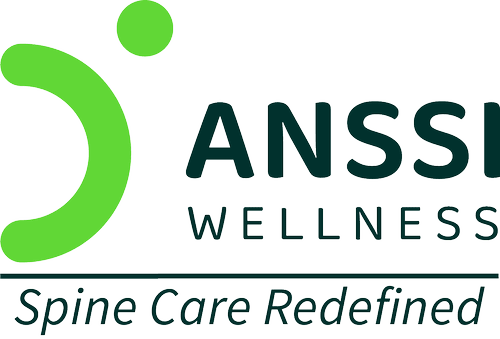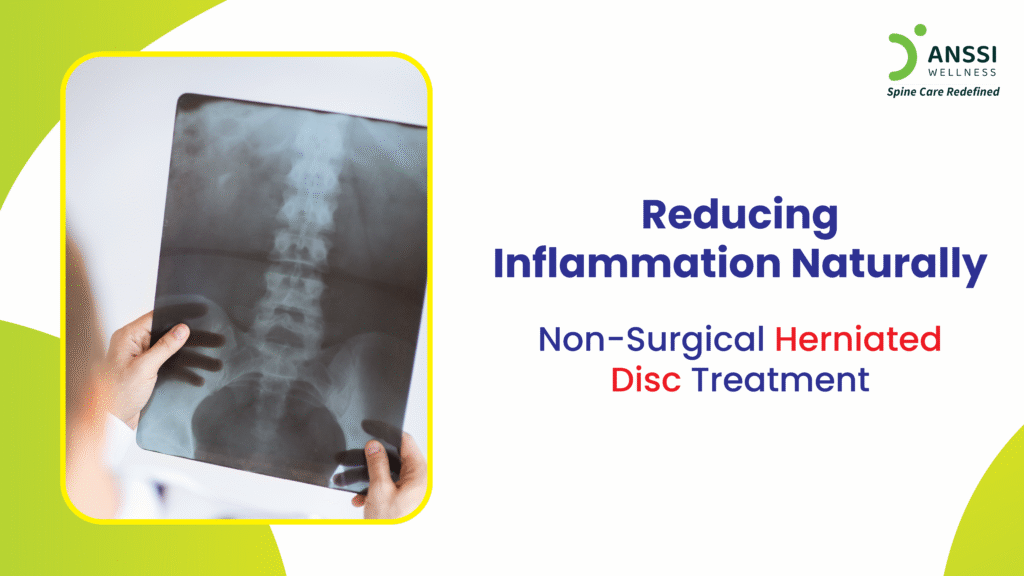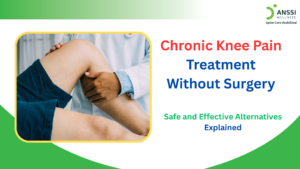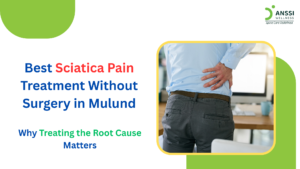A herniated disc is one of the most common spinal conditions affecting people of all ages today, especially those with sedentary lifestyles, long working hours, or repetitive strain injuries. The condition is caused by the inner gel of a spinal disc leaking out, and for most people, a major source of pain is the inflammation that occurs around the affected area.
This inflammation irritates the surrounding nerves and tissues, leading to discomfort, reduced mobility, and chronic pain. Understanding how inflammation works and how to reduce it naturally is key to achieving long-term relief without depending on painkillers.
Understanding What a Herniated Disc Really is
A herniated disc occurs when the soft, jelly-like centre (nucleus pulposus) of a spinal disc extrudes through a tear in its tough outer layer (annulus fibrosus).
When this happens, the disc material can touch nearby nerves or the spinal canal, causing irritation and inflammation. This condition typically results in symptoms such as lower back pain, radiating leg or arm pain (sciatica or cervical radiculopathy), tingling, numbness, or weakness.
- What makes a herniated disc particularly challenging is that even a small tear can create significant inflammation.
- The disc material contains proteins that the body perceives as foreign when they move outside the disc space.
- As a result, the immune system responds aggressively, increasing swelling, blood flow, and tissue sensitivity.
This inflammation intensifies pain and reduces the body’s ability to heal effectively.
How a Herniated Disc Causes Inflammation in the Spine
Inflammation is the body’s protective mechanism. When the disc material leaks out, it triggers a chemical reaction that causes surrounding tissues to become inflamed. This swelling compresses nearby nerves even more, creating a cycle of pain and discomfort.
Additionally, inflammation reduces the space needed for nerves to function properly, which is why tingling and numbness often accompany disc-related pain.
Over time, if this inflammation is not addressed at its root, the condition becomes chronic. Muscles surrounding the spine become tight and stressed, further aggravating nerve compression.
In many cases, people attempt to manage their pain with medication, but this provides only temporary relief because it does not reduce the disc pressure that is causing the inflammation in the first place.
Why Medication is Not a Long-Term Solution
Painkillers, anti-inflammatory drugs, and muscle relaxants are commonly prescribed to treat herniated disc symptoms.
- While they may provide quick relief, these medications only work on the surface level by masking the pain and reducing inflammation temporarily. They do not address the underlying issue: the mechanical pressure on the spinal disc.
- Prolonged consumption of pain medication can also lead to side effects such as acidity, liver strain, kidney issues, dizziness, and dependency.
- More importantly, medication does nothing to restore disc alignment, improve hydration, or relieve nerve pressure. Once the effect of the medicine wears off, the pain often returns, sometimes worse than before.
That is why long-term relief requires a treatment approach that treats the root cause by reducing pressure on the spinal discs and enabling the body to heal naturally.
Non-Surgical Treatments That Help Reduce Inflammation Naturally
Today, many people are turning to non-surgical, natural treatments to address the root cause of disc inflammation. These treatments are designed to relieve pressure on the affected disc, improve spine function, and promote long-term healing without invasive procedures.
1. Non-Surgical Spinal Decompression Treatment
One of the most effective natural solutions for herniated disc inflammation is Non-Surgical Spinal Decompression Treatment. This advanced treatment uses controlled, computer-guided stretching to gently pull the spine and create negative pressure within the disc.
Here’s how it helps:
- Reduces pressure on the disc: The gentle decompression mechanism helps the herniated disc retract back to its natural position.
- Improves disc hydration: By relieving pressure, decompression allows more oxygen, nutrients, and water to flow into the disc, promoting healing.
- Decreases inflammation: As the pressure on nerves is reduced, inflammation naturally subsides.
- Prevents future disc damage: It restores mobility and alignment, reducing the chance of recurrence.
Non-Surgical Spinal Decompression Treatment is painless, non-invasive, and suitable for patients who want to avoid surgery or long-term medication use.
2. Physiotherapy and Strengthening Exercises
Physiotherapy plays a crucial role in managing herniated discs naturally. Strengthening the core, pelvic muscles, and spinal stabilisers reduces the load on the spine and prevents excessive disc compression.
Physiotherapists also use techniques such as:
- Manual therapy
- Stretching
- Electrical stimulation
- Stabilisation training
These methods improve spinal support, reduce stiffness, and enhance mobility.
3. Posture Correction and Ergonomics
Poor posture puts continuous stress on spinal discs, worsening inflammation. Long hours of sitting, incorrect lifting techniques, and improper sleeping postures often aggravate disc-related issues.
- Posture correction helps by:
- Realigning the spine
- Reducing pressure points
- Improving nerve space
- Preventing repeated inflammation
Using ergonomic chairs, supportive mattresses, and correcting workstation setup are simple steps that make a significant difference.
4. Lifestyle Modifications to Support Healing
Certain habits can either worsen or heal a herniated disc. Making informed lifestyle changes is essential for long-term relief.
Key recommendations include:
- Taking movement breaks during work
- Avoiding heavy lifting
- Maintaining a healthy weight
- Practising gentle activities like walking or yoga
These habits help reduce inflammation and support spinal health naturally.
About ANSSI:
ANSSI Wellness focuses on improving the quality of life for patients suffering from spinal issues, aiming to provide relief where other conventional treatments have failed. Through advanced Non-Surgical Spinal Decompression Treatment, ANSSI is committed to helping patients avoid surgery and recover in a safe, effective, and compassionate environment.
Connect with ANSSI Wellness on LinkedIn, Instagram, and Facebook for expert guidance.




